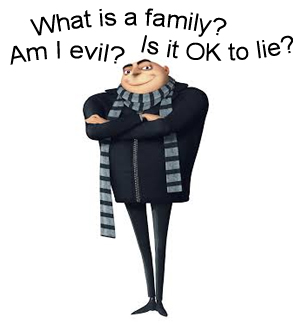I first heard about inquiry-based learning from Jessica Masterson, an English teacher at Aiea Intermediate School, who wrote an article about her rich experiences with Philosophy for Children – and the frustration and disillusionment of being forced to switch to the standards-based SpringBoard curriculum.
I decided to learn more about Philosophy for Children, which recognizes that children are capable of thinking critically and creatively. In fact, children deal with complex issues and ethical situations every day, such as parents telling them to be “good,” questions of fairness, and the death of a pet. “Philosophy offers children the chance to explore ordinary but puzzling concepts, to improve their thinking, to make more sense of their world, and to discover for themselves what is to be valued and cherished in that world.”
My son is 7 years old, and we haven’t really discussed complex issues like fairness and goodness. But after reading about Philosophy for Children, I wondered if maybe he’s not too young to think about these things. When he read the junior novelization of “Despicable Me,” I jumped on the chance to ask him questions – not just about the characters and plot, but about philosophical themes in the book.
I had a few ideas in mind: good vs. evil (Is Gru a villain? What makes someone good or evil?), family (What makes a family? Do you need to be born into a family? Can you choose your family?), priorities (What is Gru’s priority in life? Does his priority change?), and truth (What is a lie? Does Gru lie in the book? Is it okay to lie?).
Since this was my first attempt at asking meaningful questions about a book, I wasn’t sure what to expect. I tried to ask general questions and see where it took us. I kept it short and informal, so he didn’t feel as if it were a test. At one point, he exclaimed, “Give me a clue!” and I answered, “There’s no right or wrong answer. It’s your opinion.”
Here’s part of our conversation about “Despicable Me”:
Me: Is Gru a good guy or a bad guy?
Boy: Good. Bad. Good and bad. Remember when he knew that he had to save the girls, so he did?
Me: Does he change?
Boy: Bad at the beginning, good at the end.
Me: Why does he change?
Boy: The girls… because he likes them and he wants to keep [sic] good care of them. They become a family.
Me: Is family good?
Boy: Yes. Family will be nice to you.
Me: Is it good to have family?
Boy: Yes, because your family won’t hurt you, they will help you.
I could have taken it further, by asking: How does Gru treat the minions? Are the minions a family?
When my son wrote his book report, he ended it with this: “Gru learned that if you have a family nobody will hurt you, only help you.” If I hadn’t taken a few minutes to ask him about the book, I think he would only have remembered the shrink ray gun, the minions, and the cookie bots.
Do you think that philosophy should be taught to young children? Should we let young children enjoy movies like “Despicable Me” purely for entertainment, or should we ask them meaningful questions?
